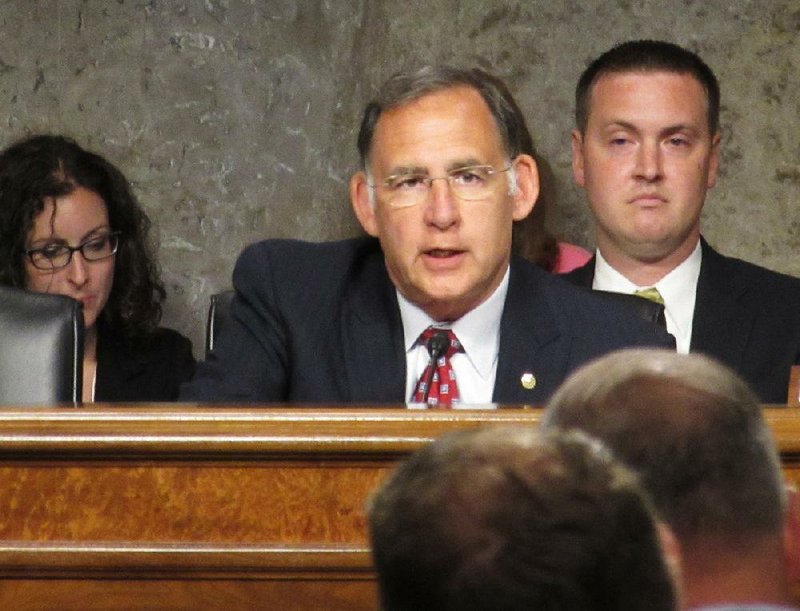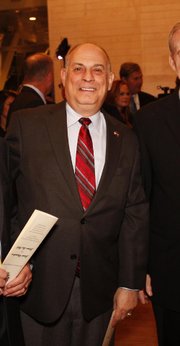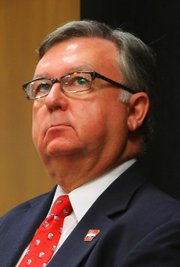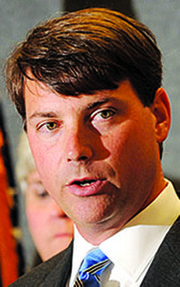Arkansas’ candidate filing period opens Monday for many elective offices, ranging from U.S. president to constable.
The party filing period begins at noon at the state Capitol and at county clerks’ offices across the state. It ends at noon Nov. 9.
The Republican Party, which controls upper-level offices in Arkansas, aims to expand its reach to include county offices — a level of government it does not control, its chairman says.
“Our goals will be to grow this majority party in larger numbers at the state level as well as at the county levels,” said Doyle Webb, chairman of the Republican Party of Arkansas. “We see some growth there. We see a lot of party switching occurring.”
Republicans made sweeping gains in 2014, winning all four congressional races, all seven constitutional office races — from governor to land commissioner — and attaining historic leads in both houses of the state Legislature.
In 2009, Democrats held 72 of 100 House seats and 27 of 35 Senate seats. The House now has 64 Republicans, 35 Democrats and one independent. The Senate has 24 Republicans and 11 Democrats.
About 11 percent of partisan elected offices at the county and state levels were filled by Republicans in 2010, Webb said. After the 2014 elections, that number grew to 35 percent.
“We see dramatic growth, and we anticipate that dramatic growth to continue,” he said. “We see a lot of people deciding that the Republican Party fits their beliefs and their values.”
“Our goal is to keep what we have and pick up a few,” said Vincent Insalaco, chairman of the Democratic Party of Arkansas. “We’re really happy with the quality of our legislative candidates.”
Insalaco said Wednesday that “well over” 40 Democrats will file for legislative seats. Webb said he expects about 100 Republicans to file for House and Senate seats.
Insalaco said the Democratic Party will have a strong focus on district-by-district issues — although national issues will probably creep into local races.
“Running for state representative is like running for president now or running for senator,” he said. “Instead of dealing with issues that are going to affect Arkadelphia or White Hall, whether it’s pre-K or minimum wage or if our streets are getting paved, they have to worry about if somebody who’s running for president’s going to build a wall.”
House Minority Leader Rep. Michael John Gray, D-Augusta, said keeping the focus on local issues is key for Democrats and voters.
“There’s been some comparison of the state party to the national party,” he said. “We’re focusing on local issues that we can actually change — that we can actually affect.”
The party primary election and the nonpartisan judicial and prosecuting attorney general election will be March 1. The primary, normally held in late May, was moved to give Arkansans a role in deciding presidential nominees. Any primary runoffs will be decided March 22. The general election and nonpartisan runoff election will be Nov. 8, 2016.
Secretary of State Mark Martin will personally handle the paperwork for the first candidate to file, as he has done in the past, a spokesman said.
In 2016, 242 state and federal offices are up for election. They include U.S. president and vice president, the U.S. Senate seat held by Republican John Boozman, the state’s four congressional offices, 100 state House seats and 17 of 35 state Senate seats. Unlike in 2014, the state’s constitutional officers aren’t up for election in 2016.
Former U.S. Attorney Conner Eldridge of Fayetteville, a Democrat, has said he’ll challenge Boozman. Boozman won election to the Senate in November 2010. Former Little Rock School Board member Dianne Curry is the only other Democrat to announce for a congressional seat. She will challenge U.S. Rep. French Hill, R-Little Rock.
On the first day of filing at the Capitol in 2014, 136 candidates filed for state and federal offices. By the end of the 2014 filing period, 413 candidates signed up to run for 275 state and federal offices.
Judges and prosecutors are nonpartisan candidates and their filing period begins at 3 p.m. Monday and ends at 3 p.m. Nov. 9. Nonpartisan candidates had the option of submitting petitions with voter signatures in September to avoid paying filing fees during the official filing period.
Two state Supreme Court seats, four Court of Appeals positions, 19 circuit judge seats, a prosecuting attorney and 92 district judge posts are up for election next year.
Candidates for county offices such as county judge, sheriff, treasurer, assessor, collector, clerk, justice of the peace and constable file at county clerk’s offices.
Independent and write-in candidates also file during this period. Municipal candidates file later in the year.
The private-option effect
One of the most contentious issues facing lawmakers — especially Republicans — is the private-option program, which uses federal Medicaid funds to provide health insurance for some low-income Arkansans.
Washington County Justice of the Peace Sharon Lloyd said she’s challenging state Sen. Jon Woods of Springdale.
Lonoke County Justice of the Peace R.D. Hopper will challenge state Sen. Eddie Joe Williams of Cabot.
State Rep. Donnie Copeland of North Little Rock is collecting funds to campaign for the seat now held by state Sen. Jane English of North Little Rock.
Former Rep. Randy Alexander of Springdale said he’s challenging Rep. Jana Della Rosa of Rogers.
The incumbent Republicans voted for the private option. The challengers — also Republicans — oppose it.
“It’s a sign of a growing party,” Webb said.
Insalaco said Republican opposition to the private option is something Democrats will focus on.
“I mean since the day I walked into this office two-and-a-half years ago, I’ve been talking about the private option,” he said. “We are so financially better off with the private option than without the private option and that rural hospitals are better off with it than without it.”
But Senate President Pro Tempore Jonathan Dismang, R-Searcy, said most Republicans are more nuanced.
“In reality, no one is going to be on the private option itself,” he said. “What they’re going to be voting on is the future of Medicaid and how we treat that particular population.”
In any case, House Speaker Rep. Jeremy Gillam, R-Judsonia, said other issues are on voters’ minds.
“I think we’ve seen over the last two or three years, jobs and the economy is the primary focus of the voters of Arkansas,” he said. “That’s still the case for this upcoming election cycle.”
Earlier election dates
The filing period usually is in late February or early March, but it was changed to November to accommodate the earlier primary date.
Proponents say the aim of the March primary is to allow Arkansas to participate in a regional Southern presidential primary to give Arkansans more influence in who is nominated for president.
But critics of the state’s election change say it amounts to an “Incumbent Protection Act,” as state Rep. Nate Bell, an independent and former Republican from Mena, called it.
Insalaco said it had hurt recruiting efforts.
“The traditional way of deciding if you were going to run for office was usually visiting with your family over the holidays, seeing your friends, seeing what their thoughts are,” he said. “All of that is taken away. Decisions have had to be made much quicker.”
Webb of Benton said his party hasn’t suffered as a result of the earlier filing period.
“It’s been a positive for us,” he said. “We’ve had people contacting us about filing. People are ready to make the decision and to make that decision final about running for office.”
Information for this article was contributed by Michael R. Wickline of the Arkansas Democrat-Gazette.



